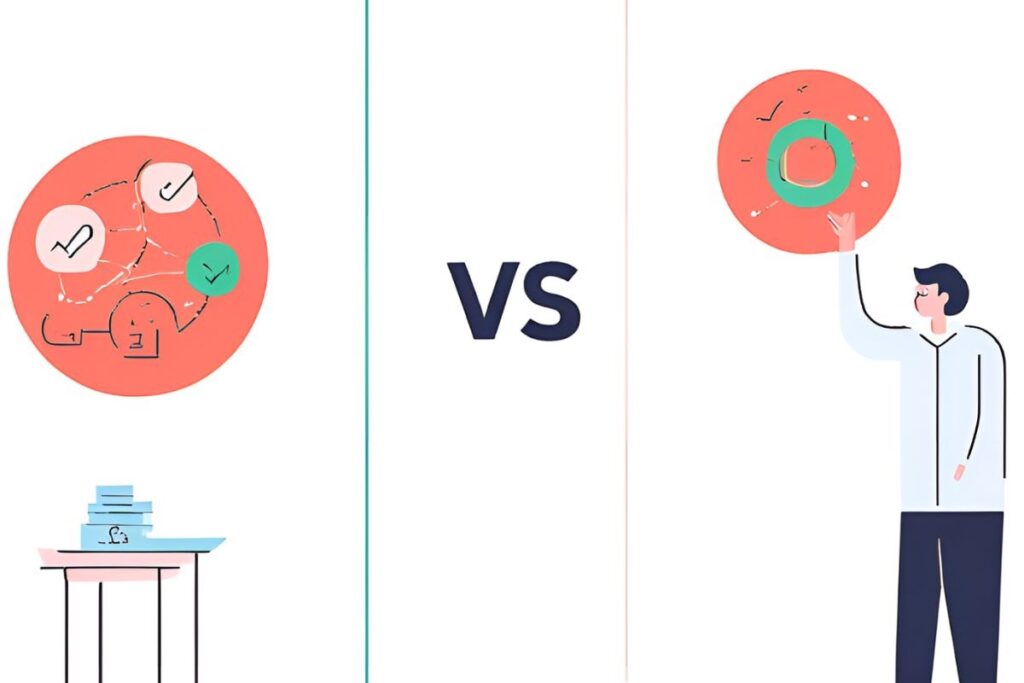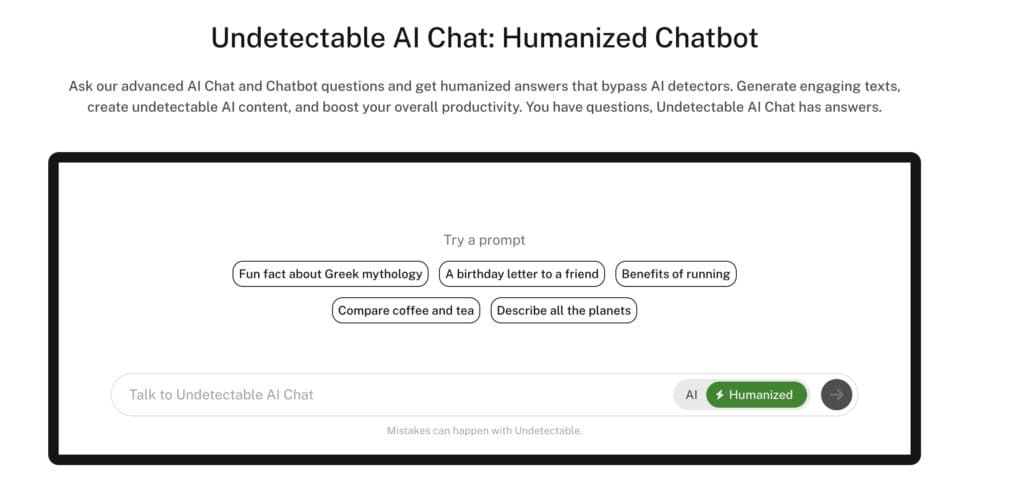Imagine you’re staring at a painting. You think it’s beautiful… emotional, even. The person next to you? They shrug. “It’s just random colors on a canvas.”
So, who’s right?
Now, imagine you are writing an essay while giving your honest opinion. Your teacher writes in the margin, “Be more objective.”
But weren’t you just being honest? Isn’t that… valuable? Or if objective always takes the win when it’s subjective vs objective?
We live in a world where facts and feelings constantly crash into each other. We’re told to think objectively but express ourselves subjectively.
We’re praised for “being real,” but also warned not to let emotions cloud our judgment.
But this ends now. In the next few minutes, I’ll break down the differences between subjective and objective in the simplest way possible with clear examples, relatable scenarios, and zero jargon.
What Does “Subjective” Mean?
Any statement you make that’s influenced by your personal tastes, opinions, or feelings is subjective. In other words, you can also call it a personal perspective or one person’s POV (point of view).
Such statements are not based on facts and cannot be proven. For instance, consider this sentence:
“Chocolate ice cream is better than vanilla ice cream.”


Never Worry About AI Detecting Your Texts Again. Undetectable AI Can Help You:
- Make your AI assisted writing appear human-like.
- Bypass all major AI detection tools with just one click.
- Use AI safely and confidently in school and work.
Now this is a subjective take. While one person might prefer chocolate ice cream, there are others who’d rather leap for a scoop of vanilla ice cream.
You form subjective sentences when you let your opinions, perceptions, preconceived notions, or feelings shape your thoughts on the topic.
That’s why subjectivity can vary from individual to individual.
What Does “Objective” Mean?
Objective is the opposite of subjective. Meaning? Objective statements are not influenced by your personal feelings or opinions and are presented in a neutral way.
These statements are universal, rooted in facts, and can be verified. Hence, they are not impartial or biased.
For instance,
“The sun rises in the east.”
“The base variant of iPhone 16 weighs 170 grams.”
“There are seven continents on Earth.”
All of the statements above are objective. Why? Because how you feel towards them won’t change them. And it doesn’t matter where you are on Earth; they will hold true.
We don’t normally use objective sentences in everyday conversations. Instead, objectivity is more valuable in formal writing, like research papers, reports, documents, or anything that needs unbiased information.
The difference simply lies in the source of information, and that’s true even for subjective vs objective nursing.
Quick Comparison Table
Even if you already knew the basic definitions of subjective and objective mentioned above, it’s still tricky to tell them apart sometimes.
However, this objective vs subjective comparison table will help clear the differences further:
| Aspect | Subjective | Objective |
| Definition | Based on personal opinions, feelings, or experiences | Based on observable facts, evidence, or measurable data |
| Nature | Personal and emotional | Neutral and impartial |
| Source | Comes from the individual’s perspective | Exists independently of personal views |
| Examples | “That dress is ugly.”“I love this song.” | “The dress is red.”“The song is 3 minutes long.” |
| Verifiability | Cannot be proven true or false | Can be tested, measured, or proven |
| Common Usage | Art, literature, reviews, and personal conversations | Science, journalism, legal reports, and academic writing |
| Tone | Expressive, emotional, opinion-based | Factual, logical, evidence-based |
| Influenced by | Beliefs, preferences, and cultural background | Data, observation, empirical results |
| Truth Value | Varies from person to person | Same regardless of who observes |
When to Use Subjective vs Objective Language
The ability to set objective data separate from subjective information can be helpful in more than one way.
It can help you make better decisions and improve your communication skills.
However, as you acquaint yourself with the differences between these two, you must also learn when to use which.
Can you use subjective information in fields like medicine, law, and science? Absolutely not. These industries rely on factual and provable data.
Involving your perceptions here will just break your case instead of making it.
Achieving objectivity, though? It’s easier said than done.
We all come from different backgrounds and experiences, and it can be challenging not to let our experiences affect the outcome of our work.
For example, teachers are supposed to grade their students objectively. The grades the students receive must be a reflection of their individual performance and not the teacher’s personal feelings.
But if a student has a history of being disruptive, or if another is always polite and eager, it can be difficult for a teacher not to be influenced by those impressions.
Even without realizing it, the teacher might grade more generously or harshly based on behavior instead of the quality of the work.
This is why many schools encourage blind grading or use rubrics to help reduce bias and keep evaluations as fair as possible.
Subjective perspectives are more encouraged in therapy, art, and literature. In these fields, individuals are expected to take their emotions and experiences into consideration.
For example, if you’re writing a review about a movie or talking about how a meal tasted, your words will naturally be subjective.
You might say something like, “I loved the movie,” or “The food was too spicy for me.”
These are not facts. Instead, they are your thoughts and emotions. Subjective language works best when you want to express yourself, tell a story, or connect with others on a personal level.
Subjective and Objective in Grammar
What makes objective vs subjective data tricky to distinguish is that they are both adjectives commonly used in the English language.
Even though they are the exact antonyms of each other, it’s easy to confuse their meanings.
The simplest way to identify a subjective sentence in English grammar is by looking for an opinion.
For instance, look at these two sentences:
Avengers: Endgame earned approximately $2.798 billion at the global box office, which made it the second-highest-grossing film of all time.
Avengers: Endgame only made $2.798 billion at the global box office because of the Marvel hype.
Both sentences mention a verifiable fact. But as per the grammar rules, are they both objective? Nope, only the first one is.
The second sentence is subjective because it includes a personal opinion about the film’s quality and success. Whether the movie was “good” or just successful because of “hype” is open to individual interpretation.
Objective is used as an adjective when we want to describe factual things without adding our personal feelings into the mix.
Sometimes, we also use objective as an adverb, i.e., objectively. This is done when we need to describe an action uninfluenced by personal opinions.
The opposite holds true for the word ‘subjective’. We use it when the factual nature of a claim is debatable, and we’re allowed to have a personal interpretation.

Subjective vs Objective in Writing & Thinking
Writing or thinking is done in two different ways, i.e., objectively and subjectively.
To make sure we express ourselves clearly, it’s vital to understand the difference between these two types, which I believe you’re quite well aware of by now.
You write and think subjectively when you take your personal feelings, opinions, and experiences into consideration.
You start with something like, “Here’s how I see it.”
When you write subjectively, you are sharing what you believe, how you feel, or how something has affected you.
For example, if you write, “I love rainy days because they make me feel calm,” that’s subjective. It’s true for you, but not necessarily for everyone.
This kind of language is very common in personal blogs, opinion pieces, reviews, diaries, or even casual conversations.
It helps us connect emotionally and show our personality, but remember that subjective thoughts are personal truths and not facts.
On the other hand, objective writing and thinking is when you focus on facts, not feelings.
When you think objectively, you’re trying to look at the situation fairly, without letting your personal opinions get in the way.
For example, saying “Rain falls when water vapor in the air condenses and becomes heavy enough to fall to the ground” is objective.
It’s based on scientific fact, and it doesn’t include how you feel about it.
Objective writing is used in news articles, academic writing, research reports, and professional documents.
Now this doesn’t make one type of thinking and writing more important than the other one. They are equally significant.
They just serve different purposes. If you’re writing a personal story or trying to persuade someone, subjective language helps you sound more real and relatable.
But if you’re explaining something or reporting information then objective language is the better choice.
Often, the best writing uses a little bit of both. The facts inform while the insights engage.
Common Mistakes & How to Avoid Them
As I said above, confusing subjective with objective is quite common even if you know their differences.
Here are some mistakes people commonly make:
Mistaking Opinions for Facts
We often assume a personal opinion is a fact. Just because something feels true to you doesn’t mean it’s objectively true for everyone.
Your best friend might confidently say, “This is the best movie ever made,” and you might fall for it. But remember, it’s still subjective, as the statement is based on personal taste, not universal truth.
In writing or conversations where facts are necessary, mixing in personal opinions without saying they’re opinions can confuse people or make your argument weaker.
It can also make it seem like you’re biased.
Always use phrases like “In my opinion,” “I believe,” or “Many people feel…” when sharing something subjective.
This shows you understand it’s your perspective, not a proven fact.
If you sense some of your sentences sound subjective when they shouldn’t be, the easiest fix is to ask Undetectable AI’s AI Chat Tool to rephrase the sentence as needed.
Forgetting That Language Can Sound Biased
Sometimes, people want to be objective, but the words they choose reveal their personal bias without them realizing it.
For example, saying “He finally admitted his mistake” instead of “He stated that he was wrong” might sound like a small thing, but the first version adds judgment, which makes it subjective.
Look closely at your word choice. Ask yourself: “Does this sentence sound like I’m judging or just describing?”
If you’re having a hard time figuring that out yourself, you can use Undetectable AI’s Ask AI Tool.

It’s a lifesaver for helping out with school projects. You can talk to it like you’d talk to a friend or a mentor and use it to rectify any such mistakes.
Curious about our AI Detector and Humanizer? Try them in the widget below!
FAQs About Subjective vs Objective
Can something be both subjective and objective?
Yes, something can have both subjective and objective elements.
It depends on how you present the information because sometimes even objective truths can be perceived subjectively.
For example, “The movie is 120 minutes long (objective), but it felt way too slow (subjective).”
Is news always objective?
While ideally, news should be objective, it can sometimes be subjective.
Factors like the reporter’s perspective or language choices can contribute to making it subjective.
What are subjective and objective pronouns?
Subjective pronouns (also called subject pronouns) act as the subject of a sentence—they perform the action.
Objective pronouns (also called object pronouns) act as the object of a verb or preposition—they receive the action.
Subjective Pronouns:
I, you, he, she, it, we, they
Objective Pronouns:
me, you, him, her, it, us, them
Conclusion
Understanding subjective vs objective can go a long way in helping you succeed in your academic and professional life.
You might think it’s no big deal until you lose major points for using the wrong form.
Remember, prevention is always better than cure.
Next time you can’t differentiate between subjective and objective, try getting some help from the helpful tools at Undetectable AI.
